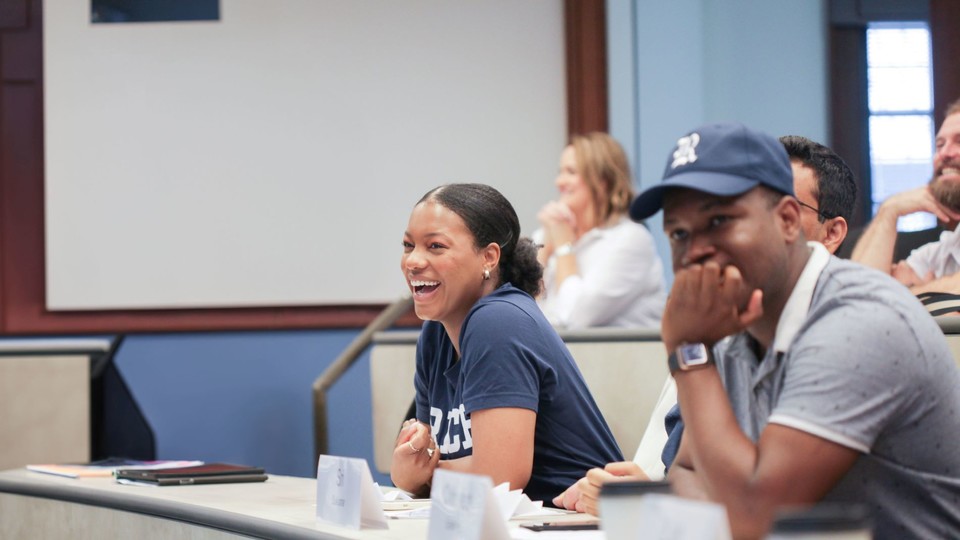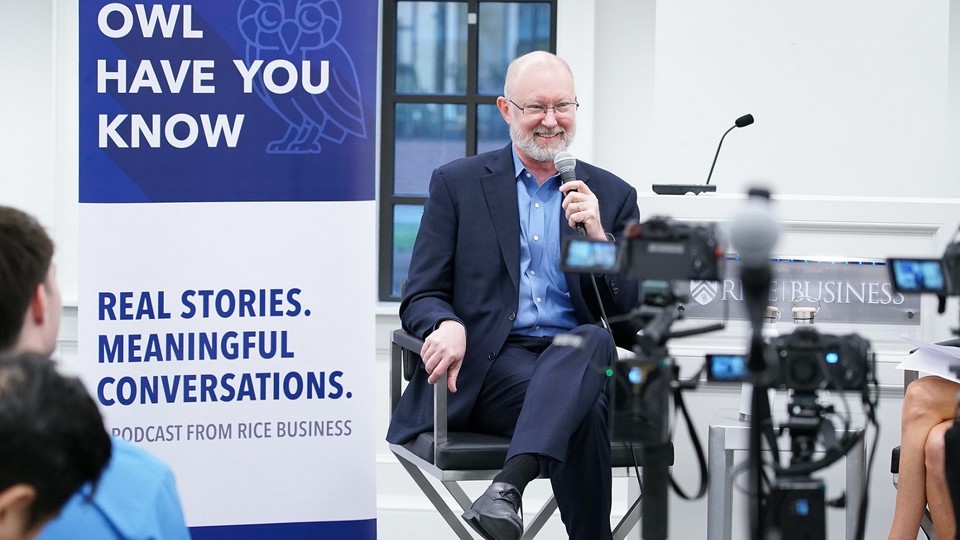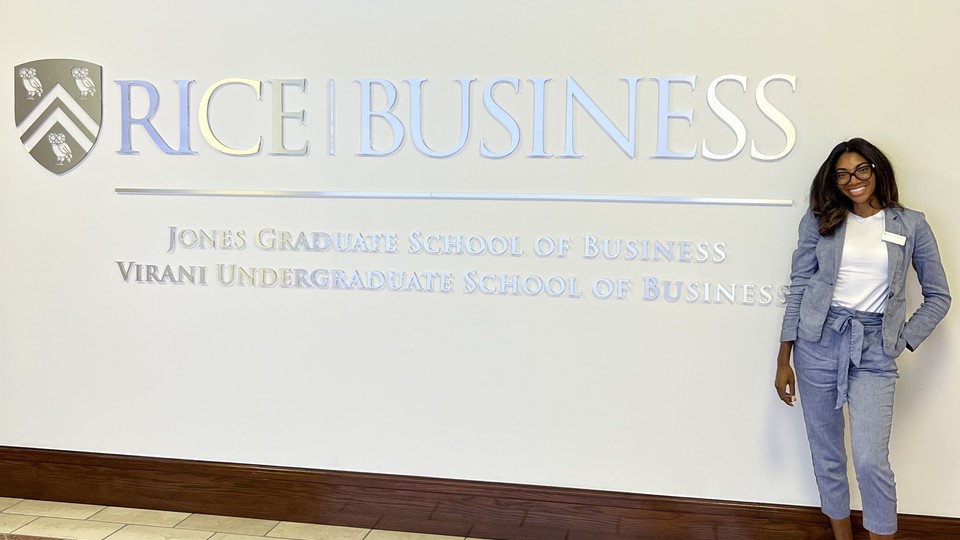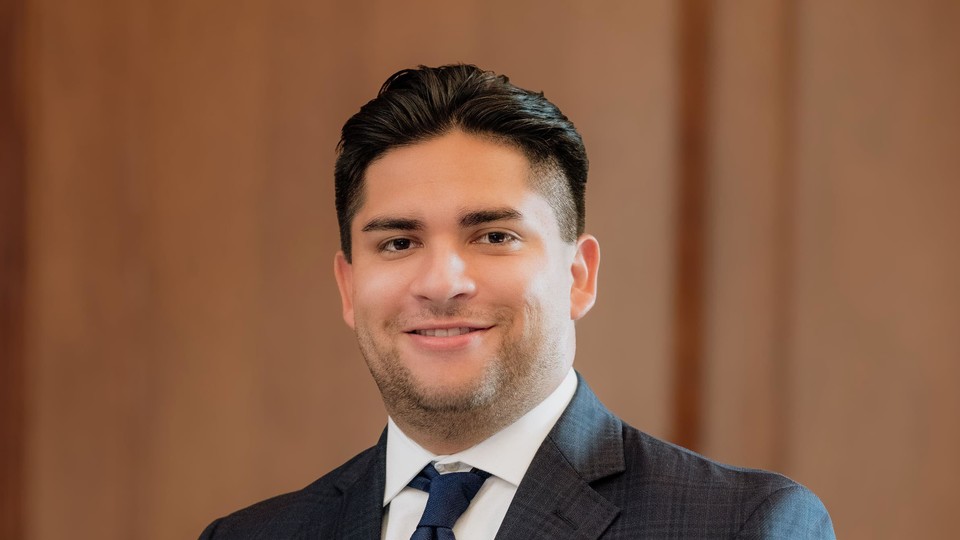ChopnBlok and Trill Burgers' founders met over 10 years ago at Rice. Now they're teaming up on comfort food.
ChopnBlok owner and Rice MBA '14 Ope Amosu is partnering with Trill Burgers to host two fusion dining nights, blending West African flavors into comfort food. The collaboration celebrates ChopnBlok’s first year in Montrose and re-connects Amosu with Bun B, whom he first met years ago.

ChopnBlok and Trill Burgers' founders met over 10 years ago at Rice. Now they're teaming up on comfort food.
ChopnBlok owner and Rice MBA '14 Ope Amosu is partnering with Trill Burgers to host two fusion dining nights, blending West African flavors into comfort food. The collaboration celebrates ChopnBlok’s first year in Montrose and re-connects Amosu with Bun B, whom he first met years ago.

Strong-Arm Leaders Often Get the Minority Vote
A study co-authored by Rice Business professor Marlon Mooijman on voter preferences in the U.S. and Europe helps explain why strong-arm leaders often get the minority vote.

In Emerging Economies, Shared Knowledge Is Key
In nascent markets, breakthrough products like clean cookstoves can save lives. But lasting impact does not come from donations. It comes from the “knowledge intermediaries” that build a market infrastructure to get these products into homes.


Based on research by Diana Jue-Rajasingh (Rice Business)
Key findings:
- Markets may need to be built from the ground up in countries that lack the markets for distributing certain life-saving products.
- Building markets to distribute these products is likely a more scalable and sustainable approach to improving public welfare than dropping them into a community for free.
- Many scholars think of governments and multinational corporations as the main actors behind market-building. But they’re overlooking an important third actor behind this work: the “knowledge intermediary.”
More than two billion people around the world cook their meals over indoor heat sources that fill their homes with toxic smoke.
The health consequences are severe. The World Health Organization estimates that roughly three million people die each year from illnesses linked to household air pollution caused by open fires and stoves fueled by kerosene, wood, crop waste or coal.
Many of these deaths are preventable. For decades, cleaner alternatives have existed that dramatically reduce harmful emissions while meeting the everyday demands of cooking. Among them are clean cookstoves — technologies designed to burn fuel more efficiently and with far fewer health risks.
Yet clean cookstoves remain far from universal. Like many proven technologies aimed at improving public health, they face obstacles that go beyond engineering. How do you introduce a life-saving tool in ways that respect local cooking practices? How do you scale adoption without relying indefinitely on donor funding?
In theory, markets are meant to solve problems like this by connecting supply and demand. In practice, they often break down when the benefits are long-term, diffuse, or hardest to capture by the people who bear the upfront costs. So what happens when the need for clean cookstoves is clear, but the market to deliver them barely exists?
When Products Exist but Markets Don’t
Who creates such markets, and how? In a new paper published in Organization Science, Rice Business assistant professor of management Diana Jue-Rajasingh looks beyond the usual suspects — governments and multinational corporations — to study a critical market-building role: the underappreciated, multifaceted actor she calls the “knowledge intermediary.”
“There are critical players doing work in this space that are not companies or governments,” Jue-Rajasingh says. “This opens the door to a third sector.”
In the clean cookstoves space, for example, the main knowledge intermediary is the Clean Cooking Alliance (CCA). (Coincidentally, the CEO of CCA is a Rice Business alum.) The CCA is housed within the United Nations but represents a broad coalition of public and private collaborators, including U.S. government agencies, nonprofits like the Shell Foundation and private companies.
Although building knowledge for a new market is costly and complex, Jue-Rajasingh’s findings show why investing in it is essential.
She contrasts the “knowledge-push” model of market-building with the more common “charity-push” approach, where products are simply given away in low-income communities. She argues that the knowledge-based strategy is more likely to produce scalable, sustainable results over the long term.
“The charity-push ignores what people actually want,” Jue-Rajasingh said. “It overlooks the need to build local capacity — whether through businesses, entrepreneurs or supportive policies and norms. You can hand out products, but if nothing is changing on the ground, the impact may be minimal.”
“If a country has only nonprofits and no companies, it won’t generate the full range of activity and momentum the industry needs — and the same is true in reverse.”
The Overlooked Role of Knowledge Intermediaries
Making a market, especially in poor and remote communities, is a complicated and expensive process with complementary components for both supply and demand.
On the demand side, education is key: Potential customers need to know that an improved product exists and that it’s relevant to them. They also need to know how to correctly use and maintain it. Sometimes financing tools are also part of the equation, to ensure new products are affordable for their target audiences.
On the supply side, distribution networks need to operate dependably to get the products to people who need them. Often, building a new market also calls for government actors to step in, either by taxing certain products differently, helping to promote specific solutions or exempting key product parts from tariffs.
All of this collaborative, educational, market-making work falls under the purview of the knowledge intermediary.
Jue-Rajasingh explains that the effort unfolds in two stages. The first involves a first-order knowledge intermediary — in this case, the CCA — helping launch high-level industry development in a small group of countries (for the CCA, these include Bangladesh, China, Ghana, Guatemala, India, Kenya, Nigeria and Uganda). At this stage, the intermediary acts as a central hub: gathering and sharing information, brokering partnerships for pilot projects and learning opportunities, and providing resources such as technical assistance, business training, financing and more.
In the second stage, a different set of organizations move to the fore: those that have worked with the main knowledge intermediary in its countries of focus during stage one. Now, those many organizations become second-order knowledge intermediaries, bringing their new market-building knowledge further afield. These second-order knowledge intermediaries are typically existing companies and nonprofits.
If a first-order knowledge intermediary like the Clean Cooking Alliance represents the hub of a wheel, second-order knowledge intermediaries are the spokes — transmitting knowledge and market capacity into new places.
Hubs and Spokes
To trace the ripple effects of the efforts made by first- and second-order knowledge intermediaries, Jue-Rajasingh conducted interviews and drew archival data from the various second-order organizations that were active in the CCA’s primary countries and beyond. She also leveraged a dataset derived from a CCA partner directory, which comprised 2,371 organizations operating across 113 countries between 2013 and 2019.
The data revealed that, indeed, second-order knowledge intermediaries that connected to the central hub of the CCA did appear to spur more entrepreneurial activity in the countries where they operated, outside of CCA’s geographical focus.
While she had suspected that second-order knowledge intermediary organizations were helping to spread market-building knowledge, she says she was struck by the level of activity she observed: “In the secondary countries, these organizations weren't just trying to sell products — they were working with other organizations to build a market infrastructure,” she says.
Of course, focusing only on market mechanisms to disseminate social solutions can be taken to an extreme, Jue-Rajasingh notes. The approach can overlook people who have very constrained financial resources, for example. Also: Countries with a healthy mix of companies and nonprofits were more likely to build strong markets for clean cookstoves.
“There were some kinds of knowledge and capabilities that companies could take up, and others that nonprofits could,” Jue-Rajasingh explains. “If a country has only nonprofits and no companies, it won’t generate the full range of activity and momentum the industry needs — and the same is true in reverse.”
Written by Katie Gilbert
Jue-Rajasingh (2025). “Second-Order Knowledge Intermediaries and Multi-Country Entrepreneurial Entry into a Nascent Industry,” Organization Science.
Never Miss A Story
You May Also Like
Keep Exploring
What Do MBA Rankings Really Measure?
MBA rankings can be useful, but what do they really tell you? Learn how annual lists are created, what they can reveal about top schools like Rice Business and how to use them in your MBA search.


When you’re narrowing down your dream business school, you may be pointed toward MBA rankings. There are many lists identifying the “best” programs, but it’s not always easy to understand what each of them truly measures.
Rankings can reveal a lot about what makes a top MBA program like Rice Business unique. Let’s dive into the methodologies behind major rankings, how to read these rankings effectively and what they can mean for you.
A Quick Guide to MBA Rankings
In your MBA search, you’ll find a number of sites and outlets reporting on a variety of elements from broad topics like overall program to specific lists, like which schools have the most female MBA students. Here’s a sample of what you might find on each website:
- U.S. News & World Report: Overall MBA programs; Best online MBA programs; Best MBA programs for specialties, like entrepreneurship, accounting, management, etc.
- Poets&Quants: Best MBA and undergraduate programs for entrepreneurship; Most influential business schools; Best international MBA programs
- Financial Times: Top 100 business schools in the world, with interactive columns evaluating salary, carbon footprint, diversity, faculty expertise and more
- Bloomberg Businessweek: B-school rankings by compensation, learning, networking, entrepreneurship and diversity; MBA schools ranked by region
- Fortune: Annual MBA program ranking that includes components like acceptance rate, median base salary of new grads, median GMAT and tuition
- Princeton Review: Best Business Schools based on alumni and student surveys; Top graduate entrepreneurship programs (No. 1 spot held by Rice Business for six years)
Interested in Rice Business?
How Are MBA Programs Ranked?
At first glance, rankings might seem straightforward: the higher the rank, the better the school, right? The truth is that each ranking system uses its own formula, weighing certain factors more heavily than others.

For example, rankings from the U.S. News & World Report emphasize school reputation and career outcomes. To do this, they measure peer and recruiter evaluations in a quality assessment (25%), starting salary (20%), salary by profession (10%), employment rates at graduation (7%) and at three months (13%), and evaluation of student selectivity (25%), which includes student GMAT/GRE scores, undergraduate GPA and acceptance rates.
By contrast, The Financial Times takes a more international approach, evaluating components like career progression (i.e. salary increases), professional growth, faculty research and education, international mobility, alumni workforce and various diversity metrics.
And business school aficionado Poets&Quants combines multiple rankings like USNWR, The Financial Times, Bloomberg Businessweek, LinkedIn and the Princeton Review, aiming to produce a composite view.
Reading Between the Rankings
Rankings can offer helpful benchmarks, but they might not capture the full value of a school’s MBA program. That’s why you should consider the factors that matter most to you and what your long-term goals are as you begin narrowing down your options.
When evaluating rankings alongside your personal goals, be sure to keep in mind that:
- Methodology matters. Each ranking system emphasizes various metrics and focuses on specific priorities, like career progression or diversity.
- Metrics can be narrow. Most lists measure specific quantifiable metrics, which can discount intangible (but critical) factors like campus culture, peer relationships and networking strength.
- Lists change annually. Rankings fluctuate, sometimes due to minor statistical shifts and other economic and geopolitical factors. A slight change in rank may not necessarily reflect a real difference in program quality.
Rankings can offer a ton of insights and key data, but it’s still worth looking past the numbers to understand what drives a school’s reputation and student success. At the end of the day, what matters most is your “fit” with a particular school.
Making the Rankings Work for You
At Rice Business our faculty expertise, career services and engaged alumni network have earned Rice Business consistent recognition across multiple ranking platforms. MBA rankings are valuable guides, but should be one of many tools you use in your decision-making process.
The right MBA program should align with your personal ambitions, values and learning style, while equipping you with the network and skills to reach your goals. One of the best ways to find your community is by visiting a school. We encourage you to contact a Rice Business recruiter or attend an upcoming event to learn more about our MBA programs.
You May Also Like
Keep Exploring
Entrepreneurship is in the Rice DNA feat. Al Danto ’00
Season 5, Episode 17
In this special live episode, Al Danto '00, senior lecturer in entrepreneurship, shares his extraordinary career journey and his story of recovery after two life-threatening medical crises.

Owl Have You Know
Season 5, Episode 17
Al Danto, senior lecturer in entrepreneurship, has been a trusted mentor and beloved member of the Rice Business community for more than two decades. A serial entrepreneur, he launched his first company at the age of 23, growing it through multiple acquisitions before selling to a private equity-backed group. After earning his MBA at Rice Business, he returned to teach New Enterprise, Enterprise Acquisition and their corresponding E-labs – guiding students as they build and acquire businesses of their own. He is also a driving force behind the Veterans Business Battle.
Beyond his professional success, Al has had a personal journey few could imagine. In May 2022, Al experienced two life-threatening medical crises and was placed on advanced life support. Sixty-five days later, he walked out of the hospital determined to return to the classroom, and by October, he was back.
In this episode of Owl Have You Know, Al shares his extraordinary career journey, his story of recovery and why he urges everyone to “grab life” and make a difference.
Watch
Listen
Subscribe to Owl Have You Know on Apple Podcasts, Spotify, Youtube or wherever you find your favorite podcasts.
Episode Transcript
-
[00:00]Maya Pomroy: Welcome to Owl Have You Know, a podcast from Rice Business. This episode is part of our Up Next series, where faculty, researchers, and alumni weigh in on the trends currently shaping the world of business.
Rice Business is known for its quality and its caliber of professors. And some have even reached legendary status. One of those legends is Al Danto. Al's classes are a mix of MBA bootcamp, a part entrepreneurial masterclass, and part life lessons. He is truly an extraordinary professor and someone that everybody wants to get into that class, no matter how long you wait.
From running lemonade stands to outperforming his peers and Little League raffle ticket sales, Al is always someone who sees opportunities where others see obstacles. At the age of 24, he launched a business, grew it to be listed on the Inc. 500 Fastest Growing Business list, and then exited through a sale to private equity. Since then, he has launched multiple ventures, consulted with business leaders about high stakes and strategic exits, and invested across multiple industries. And through it all, as a person who has survived two life-threatening medical crises, with a renewed sense of hope, faith, and determination to live each and every day to its fullest.
His life is a blend of grit, gratitude, business prowess, and determination. And he is here this evening to talk to us about the mindset and the lessons he's learned that can transform the way that we live and the way that we lead. Please, join me in welcoming Al Danto.
[02:02]Al Danto: Woo. Thank you. Woo. Here we go, baby. Thank you, Maya.
[02:09]Maya Pomroy: Absolutely!
[02:09]Al Danto: Thank you very much for the introduction.
[02:11]Maya Pomroy: Yeah. So, my first question is, how many of those tickets did you sell?
[02:15]Al Danto: Well, it was really interesting. We talk a lot about DNA, and maybe I'll give you some insights to the class, kind of, what were you as a kid, right? What did you do as a kid? What did you enjoy? Were you analytical? I know Al Galindo. I've worked with a lot. Our latest faculty member, it always been engineering, always been analytical. Other kids are outgoing, you know, jumping out, you know, off of roofs and stuff like that. And one of mine, we had to sell raffle tickets for Little League. And we were outside the bank. It was Friday. I had my Little League uniform, getting ready to go to the game. And my dad, we saw people come out of the bank. Back in the day, everyone cashed their check on Friday. So, I walked up, this little kid, and I said, “Hey, would you like to buy a raffle ticket?” And they couldn't say they didn't have any money.
[03:02]Maya Pomroy: It's all about marketing and being in the right place at the right time.
[03:05]Al Danto: It is. It’s being, you know, being in the right place at the right time. And then, you know, so that became my secret spot to sell raffle tickets, based on people had money, they came out of the bank on Friday. As a little kid in a baseball uniform, how could you say “no” to them, right?
[03:20]Maya Pomroy: Right. No, you can't say “no” to a kid, like, with Girl Scout cookies or, you know, anything that the Boy Scouts are selling as well.
[03:26]Al Danto: Exactly.
[03:27]Maya Pomroy: So, you grew up in Michigan? Cold.
[03:29]Al Danto: Cold.
[03:30]Maya Pomroy: Cold in Michigan. And so, did you always know that this is what you wanted to do, or was it something that sparked that interest for you?
[03:38]Al Danto: You know, that's a good question. I grew up in Michigan. A fun fact, I played ice hockey for 55 years.
[03:45]Maya Pomroy: Still playing?
[03:45]Al Danto: I still play. I play every Friday. And I love to do that. So, I grew up in Michigan, and a lot of life evolved. So, I came to Houston for a summer. We're supposed to work in Alaska on fishing boats. It fell through, so we had to do something. We came to Houston and got a good summer job. And I met my wife.
[04:05]Maya Pomroy: Donna?
[04:05]Al Danto: Donna. We dated that summer. And I went back to Michigan, finished school, and came back down there. I said, “I would never live in Houston. It was too hot. Flooded, cockroaches, 100 degrees,” like it is now. And so, I said, as soon as you graduate from UT, we're going to go back to Michigan. That was 39 years ago or 40 years ago. And been here ever since, because in the winter, got to fish, play ice hockey, play softball, and do the things that I enjoyed. So, been here ever since.
[04:34]Maya Pomroy: So, when you came to Houston, tell me about your very first business that you started at the age of 24. So, it was a document business.
[04:46]Al Danto: Yeah.
[04:48]Maya Pomroy: What started that? What was, sort of, the impetus to that?
[04:52]Al Danto: So, my first job out of college was the NCR Corporation. And we would help companies when they go from a manual system to an automated system. A lot of companies didn't have computer sips back then. So, we would work with the programmers to design an old-fashioned thing called business forms. Anyone heard of a business form before? It's an invoice, a check. So, if you think about all the paper that companies consume, you know, banks and hospitals and universities, they all came out at the end of the printer. They came with… so, you print invoice, little things.
[05:23]Maya Pomroy: Well, the little things that you'd have to rip off on the side, right?
[05:26]Al Danto: So, we would help companies get set up and do their paper flow system and their accounts payable system. And one of our vendors was an envelope sales rep. That's all that we did at NCR, was that one product, because they figured, if you're going to spend all this money on a computer system, then you're going to get your first forms from us. You could go out after that and get them anywhere else. But they had to go into envelopes and their other products. So, I developed a relationship with other sales reps and they became our vendors. And they provide us with those products. So, one of them was an envelope sales rep. And Blaine Smith, his company started to have troubles. It was the mid-’80s. Anyone know what the price of oil was in the mid-’80s?
[06:06]Maya Pomroy: Depends on which part of it of the mid-’80s.
[06:09]Al Danto: About $8 a barrel, right? It was really, really low. And his company was hurting. So, they were starting to go out of business and he couldn't supply our envelopes when our systems went live. So, I said, we need to find an envelope company to get them from. And he was like, “I got just the idea.” There's these private label manufacturers that will make envelopes and we can sell them to our customers. And so, he started selling them. I said, “I don't care where you get them from, as long as you get them to me.” That was my problem that he hadn't solved, right? You have a computer system going live. These forms are coming out, and no envelopes.
[06:43]Maya Pomroy: Imagine that's a problem — to not have envelopes.
[06:45]Al Danto: Yeah, huge problem. You've got this computer system in there and all that. So, I said, “I don't care where you get them from. And so, let's start a company supplying envelopes.” And so, started the classic envelope company. And we went to private manufacturers. And they made the products mostly for him and they fulfilled our needs and then others. And then his company eventually went under. We took the three salespeople from that company and brought them in. And we needed a place to work, right? So, we started in our apartment. We started a company in our apartment.
[07:16]Maya Pomroy: Sounds like that happens a lot in the garage or the apartment.
[07:19]Al Danto: Right. Yeah. I think that's the first lesson for entrepreneurship, is, what's the problem? What's the core problem? And what can you do different, right? So, we were able to supply envelopes at a lower price than even manufacturers in Houston could because we were buying them from other areas and bring them in. And we turned our apartment into a large storage area. So, we'd store envelopes for Schlumberger and Cisco Foods, Allied Bank, the big, big companies and big hospitals. And then from there, you know, we ultimately grew and expanded and started to acquire manufacturing companies.
[07:54]Maya Pomroy: Yeah, I was going to say, how did you scale? Because that sounds like a lot of customers to have to provide your product to.
[08:01] Al Danto: Yeah. You scale by need, right? You scale by, you scale by need. And so, customers started to ask for other products. They asked for those forms. So, we found private label forms manufacturers. They asked for printing. So, we found private label printing manufacturers, and we found out that customers wanted to have kind of a one-stop, kind of, a mid-market. They didn't want to deal with four or five different vendors. So, we're able to become a one-stop for these companies.
And then, ultimately, we acquired our first printing manufacturing company, but we were in business for probably three or four years as a distributor before we ever acquired our first manufacturing company. Then we acquired our first manufacturing company, and then we started to acquire other manufacturing companies and, kind of, consolidate it together. Grew from there.
[08:45] Maya Pomroy: Wow. So, you did that for a bit, and then you decided to sell.
[08:50] Al Danto: Yeah. Crazy story, you know. It's really interesting, is that hardly anyone in here has heard of business forms, right? But in the early '80s, that was kind of the beginning of this industry. Because computers were coming out, and people had them. We became a vendor for Anheuser-Busch, MillerCoors, the distributors. We would follow software companies, kind of, like I did at NCR.
So, when a software company would install a system, they'd call us. So, we contracted with software companies that supplied software, like beverage distributors, dry cleaners, travel agencies, and when they installed a system, they contacted us for the forms. So, we did that and eventually had a couple sales reps that just handled beverage wholesalers. And we went out to the National Beer host... Beer Wholesalers conference in Las Vegas.
[09:40] Maya Pomroy: It's a good conference.
[09:42] Al Danto: Good conference. It was a great conference. All new beer is coming out. You get the taste of them, you got everything coming out there, right? So, we did that, and I walked up and there was a trade show display, and they said, "This is... It was the very first kind of electronic pad." And they said, "We're going to eliminate paper." I said, "Oh, crap. [inaudible 00:10:02] the paper vision, you know.” And believe it or not, you know, when that came out, I came back, and I had all these... We were, like a little Pac-Man buying up these little companies, and they're big national Pac-Men come, kind of, buying companies.
[10:16] Maya Pomroy: M&A, yeah.
[10:17] Al Danto: Really big, right?
[10:19] Maya Pomroy: But when you saw that, you knew?
[10:21] Al Danto: I saw it and I knew, you know, I was, kind of, literally, like, writing on the wall that I, that I, kind of, saw and we'd be getting these offers and things were going on. I was in probably, like, last... Late 30s, 37, 38 years old.
[10:34] Maya Pomroy: So, this is, like '99, '98?
[10:35] Al Danto: Exactly. '90, 98. So, I got this crazy idea. I was in an advisory board. We'll talk about our round tables a little bit to the Alumni Association. I came in and I said "Hey, I want to sell my company." They said, "What do you want to do?" And I said, "Well, Rice has this MBA program was had been the flex program. I knew some people had gone through it and they were going to convert it to the executive MBA program, the weekend program." I said, "I want to get my MBA." And they said, "What's next?"
I said, "I don't know, you know, if I can put away enough money, I'll be okay." So, I came back and hired a consultant on an industry and investment banker, and I said, "I made it sell the company." And he handled all that and did that, I applied to Rice, and I got in into Rice. And so, I sold to a company that's private equity backed, and they were "Who's sort of the more business forms company?"
[11:25] Maya Pomroy: [inaudible 00:11:25].
[11:27] Al Danto: One person. They were the largest business forms company in the world.
[11:31] Maya Pomroy: Wow.
[11:31] Al Danto: $2 billion in sales of business forms and some executives left, they got private equity money and, and they requiring companies and they acquired ours. And, you know, what they said during due diligence? They were not worried at all about a paper ever going away. They said, "No one will ever not have a paper check."
[11:49] Maya Pomroy: Mom still has paper.
[11:52] Al Danto: Yeah. Paper invoice, a paper purchase order, a paper something. And so, I said, "You know, I'm ready to kind of move on." And so, we, you know, we exited and, and, and came back to Rice.
[12:05] Maya Pomroy: And it's funny because you hired somebody to help you through that process, and now you're a person that helps people through that process. Right? Is that that's some of the... Some of what you gained by coming to Rice and...
[12:18] Al Danto: Exactly.
[12:19] Maya Pomroy: Right? So, that's interesting. So, you applied in '98 because you graduated in 2000. Right? Which is when you sold your company. Right? So, you were class...
[12:30] Al Danto: Yeah. It was '99.
[12:32] Maya Pomroy: '99. Okay. And so, tell me about what the business school was like when you came 25 years ago. Because it's been a minute, so I'm curious to know because I don't think that... Well, some people in this room, I'm not going to ask. I'm put anybody on the spot. What it was like in the year 2000 of walking? I mean, it didn't look like this, right?
[12:52] Al Danto: This nothing was here, nothing was here. We were in a little, I think we had a couple classrooms over in Herrig Hall. I think the entire we were the EMBA class, first Weekend Class, Full-Time. I think there might have been 200, I don't know.
[13:06] Maya Pomroy: How many, how many kids that... Or how many, how many people in the EMBA class?
[13:08] Al Danto: Our class is 41. Heather Kopecky was one of my classmates. She's here. She's here today. We'll bring her in. But I think there was...
[13:16] Maya Pomroy: Was she on your team? I'm just kidding. Well, no?
[13:19] Al Danto: We went deeper than that. We started a company together.
[13:21] Maya Pomroy: Yes, I know. I know. Well, so, let's dovetail into that, because you're here. Maybe you can add some color. So, you started in 2000... Well, you started in '98.
[13:32] Al Danto: '98, yeah.
[13:33] Maya Pomroy: In the EMBA program. And you started another business with a teammate for nursing. There was, like, a nursing shortage in terms of staffing.
[13:45] Al Danto: Right, right.
[13:45] Maya Pomroy: So, how did that happen? Because I know that a lot of us in here have... Are, you know, part of Rice and got our MBAs from Rice, and we know about how, you know, we have our teams and...
[13:55] Al Danto: Right.
[13:56] Maya Pomroy: You know, and a lot of teams actually go on to launch businesses and become entrepreneurs. So, how did you two meet?
[14:03] Al Danto: Yeah, so entrepreneurship's in the Rice DNA, you know, which we'll get in into, I think, a little bit, but it's always been, "Okay, we're going to provide a practical framework." But the reality is you have to get out there and do it. You know, and you have to embrace that culture in a lot of academic in university institutions aren't going to do that. They're not going to, it's going to give you this free will to go out there and do it. But Al Napier and Ed Williams, the founder of the program here, said, "We want our entrepreneurs to learn in the classroom, but get out there."
And we really haven't changed that from the early '80s, I think, late '70s when we started teaching it. So, that's in our DNA; it's a really important thing, which we'll touch on. So, we were encouraged to think outside the box. And when you come back to school, when you come back to Rice, and you come back to MBA program, especially when you come back as an executive, a professional, and any age, you're looking for something different, I think on the other side, right? I think you really are.
[14:56] Maya Pomroy: There's a before you say there's a, before the MBA, and then there's after.
[15:00] Al Danto: There's a before and after, and in between, you're almost, like, in a cocoon. I mean, you really have time, and I encourage everyone here, you know, coming in, you know, use that time, and you don't know what you're going to do on the way out. But all kinds of doors will open for you. You'll see new opportunities and encourage you to do that. So, we were encouraged to do that. And it really came from the top and from our professors. So, we were encouraged in a class. We had to go out and start a company. And it was an elective class that I teach now, pretty much.
[15:28] Maya Pomroy: Al Napier was teaching it at the time.
[15:30] Al Danto: Al Napier was teaching it.
[15:30] Maya Pomroy: The other Al.
[15:31] Al Danto: The other Al, yeah.
[15:33] Maya Pomroy: Yes.
[15:34] Al Danto: Al Napier's teaching it. And we had to come up with an idea. So, Heather and I think we were at Valhalla.
[15:40] Maya Pomroy: For sure.
[15:41] Al Danto: Great ideas happened over alcohol, right?
[15:42] Maya Pomroy: Does everybody know what Valhalla is?
[15:44] Al Danto: A little bit of Valhalla?
[15:45] Maya Pomroy: Well, you need to tell him. I mean, if you don't, it's around the... It's this wonderful little bar.
[15:48] Al Danto: I actually think... Where's Patrick Gray? I think the Rice Alumni...
[15:51] Maya Pomroy: He's right there.
[15:53] Al Danto: So, it's going to have an after party to Valhalla. He has an open cab.
[15:58] Maya Pomroy: MBA is out to party.
[15:58] Al Danto: So, there's an open tab, and I think beer at the time was 75 cents a beer. So, Heather and I were probably into a $50 worth of beer, and we had to come up with this idea. And you know, I call them DFI. Everyone has the...
[16:11] Maya Pomroy: So, DFI? Okay. So, back up. So, I love this. So, we talked a little bit about this. So, what does everybody think what DFI stands for? Any guesses? Oh, come on.
[16:23] Al Danto: Come on.
[16:24] Maya Pomroy: You know what the DF stands for.
[16:27] Al Danto: It's a Dumb Freaking Idea. There you go, you know. And they're at the beginning...
[16:33] Maya Pomroy: A Dumb Freaking Idea.
[16:34] Al Danto: I mean look who would've ever thought you're going to get in a car with a stranger or worse, let stay at their house or recruit nurses from the Philippines. But Heather was a, was a PhD nurse, and her classmate was a Ph.D. nurse from the Philippines. And she knew the pain point. Again, we're going to come back to this need
[16:51] Maya Pomroy: Solving problems.
[16:51] Al Danto: Hospitals were really... Yeah, solving problems. Hospitals were really struggling with nursing shortage, and Heather came up and with the idea, and we came back, we wrote a business plan to recruit and place nurses from the Philippines. And we went to Memorial Hermann and St. Luke's, and we were able to secure agreements with them to do that. And we started Universal Worker, and we recruited nurses from the Philippines. And you know that that became, kind of, post Rice, and we, as we came to our graduation, we had our first checks from Memorial Hermann and St. Luke's, and we were off to the races.
[17:29] Maya Pomroy: How much were your checks for?
[17:30] Al Danto: I think, ultimately, maybe a total of about $100,000.
[17:35] Maya Pomroy: Well, that's not too shabby.
[17:37] Al Danto: So, they prepaid to, and that set us up, and we recruited out of the Philippines, and our... We had 10 full-time employees, and our entire payroll, they're all college graduates, pretty much nurses. Our entire payroll was about $5,000 a month, so we were outsourcing before outsourcing was cool and back then and we recruited, and we placed nurses in Memorial Hermann and St. Luke's, Seton in Austin and some other facility.
[18:05] Maya Pomroy: And so, how long did you have that business?
[18:08] Al Danto: You know, we ran it for, I think about seven years, and then we got acquired by an International Nurse Recruiting and Staffing company and the really cool thing to me... I had come out one of my life, I didn't want to jump back into the rat race after, after Rice, and I was fortunate enough to put away enough money to not fly private jets or have a place in Aspen, but I could pay for my kids' college education and I could do things that I, that I wanted to do, right? People call it FU money somewhere. I had a little, I had a little F, but I have a Big U, you know, so, it was kind of that, and I was able to, kind of, do these things, and I sat on a nonprofit, and I got approached by somebody.
They said, "Hey, you went to Rice?" People are going to look at you a little different when you come through Rice, right? "You got Rice MBA. You must have learned something there." And you will, you'll learn a lot. And someone on a nonprofit board said, "Hey, we're approached by a private equity company to be acquired. Would you represent us?" And I said, I said, "Sure, you know, I'd do that." And I, and I did that, and it worked, worked pretty well. And then our company that we were running, we really never had to open up a U.S. office after 911. We didn't open up a U.S. office, and our nurses came in and they were integrated into the Philippine culture.
They saved their expense money, and the Philippine nurses at the hospitals brought them in and let them stay with their families and everything. So, we never had to open up an office, and it really was good for me. I had young kids, so I was able to, you know, coach their games and be around and travel and do all that stuff. And I didn't want to jump really back into the... In the rat race, and didn't have to, and then start... Then Al Napier asked us to come back to the class.
[19:51] Maya Pomroy: So, right. So, let's talk about that. So, you were out living your life as an entrepreneur and doing all the things that you love to do, and the folks here, they certainly didn't forget about you. And came back and approached you. So, tell me the story about how Al and... It was Ed Williams and Al, and how they approached you, and they're like, "I have, I have an idea for you. I have an entrepreneurial venture for you over here at Rice Business."
[20:17] Al Danto:Well, things just started to grow, right? The entrepreneurship program started to grow, and in 2000, we had plans for the new building.
[20:25] Maya Pomroy:And it wasn't growing at the speed everywhere else, that it was growing here.
[20:30] Al Danto:Entrepreneurship wasn't right, you know, entrepreneurship is in our DNA, like, I said, it goes back to the '80s, but we started the Rice Alliance. And the Rice Alliance was an idea that Steve Currall and some others had, Al Napier and Ed Williams, and others to kind of combine what was going on at Rice around technology, funding, and business, and pull it all together. And they came up with the idea for the Rice Business Plan Competition, and that was launched in 2000, the Rice Alliance was launched, and again, that was somebody's DFI. So, what you see today with the Rice Alliance and the largest business plan competition in the world, and all the impact that had it started as an idea, back then. [inaudible 00:21:11].
[21:12] Maya Pomroy:Sort of the iPhone, right?
[21:13] Al Danto:Sort of the iPhone.
[21:13] Maya Pomroy:That was a DFI.
[21:14] Al Danto:Yeah, they all were. So, you know, Rice started and just kind of continued to expand, and then Rice kind of went all in, I think on entrepreneurship, and you, and you have to have it from the top. So, Gil Whitaker, who was the dean at the time, said, "Hey, we're going to be... If we're going to be entrepreneurial, we have to be entrepreneurial-minded and we have to support these ideas that come through and give them encouragement and grow." And they started... It started to grow, and we started to expand the programs as it went on. And Heather and I came back, and we started to present as a case study here. And then eventually that lead led to taking over a class. And then, and then we needed something for our alumni.
So, we came up with another DFI, and that was the JGSEO, the Jones Graduate Entrepreneurs Organization. Which we model after the EO Entrepreneurs Organization and YPO, which is a peer-to-peer support group. So, we just said, "Let's have events education. Let's have support for our alums." So, our alums started to meet in little advisory boards, small groups of about eight to 10 alums that they meet and support each other, help with their entrepreneurial ideas and their businesses.
And today, I am really proud to say, since through a lot of the work through the Lilie Lab, Spencer Randall... I don't know if Spencer's here; he heads up our round tables, and we have about 250 alumni. They're actively engaged in our roundtable. So, as you come through, as an alum, you'll be connected for life through the RIE and Lilie Lab, and our alumni meet in these roundtables. So, we started to do that, and we started to have educational events.
[23:00] Maya Pomroy:And the Lilie Lab is also something that, you know... Could you tell everyone, those who may not know what the Lilie Lab is? Because that's really, really unique to Rice, and other people try to copy it, but it's just a copy.
[23:12] Al Danto:Yes. So, I think the Lilie Lab is the next version of Al Napier and Ed Williams. So, when Al Napier, Ed Williams were here, if you had an idea, if you wanted to bounce something off them, if you wanted a connection to go out there and reach and connect, you went to them. And then after I came through, you went to one of the three of us, and then it grew and expanded, and then our... We came in there and then, and then eventually we just needed so much more than that, right?
You needed to have a hub that would connect, a place to go to, a place to bounce ideas off of, a place to develop your ideas, a place to connect you to funding and resources, and support. So, the Lilie Lab eventually became our latest version of that, and it's an incredible program that we have here now, it's available to students, graduate, undergraduate, and alums. And it's...
[24:07] Maya Pomroy:It's an idea lab.
[24:08] Al Danto:Yeah, it's an... It's idea lab. It's a hub. It's a connection, it's so much more. And I think what's really cool is Yael Hochberg and Hasan and Kyle and Patrick, that run… That have really maintained the spirit of an entrepreneur needs a place to go to you know, vet their ideas, to connect to resources, to be supported, to fail. And be able to fail...
[24:35] Maya Pomroy:To take risks.
[24:37] Al Danto:To take risks. You have to take risks.
[24:37] Maya Pomroy:Take risks.
[24:38] Al Danto:Right?
[24:37] Maya Pomroy:Right. And that space, if you haven't been in there, which I hope a lot of you have, is this just so much energy. You walk in-
[24:43] Al Danto:There's so much in there.
[24:44] Maya Pomroy:Even, I mean, there's... It's just you feel, like, you can come up with so many DFI and, like, maybe one of them will work. And it's really, really exciting just to be surrounded in that environment and by the people that are there. I mean, it's just this energy that's palpable, Al.
[24:59] Al Danto:Exactly.
[24:59] Maya Pomroy:That I just don't... You just don't get that everywhere.
[25:03] Al Danto:You don't get anywhere. And it's really... You know, MBA, y'all know what an MBA stands for?
[25:09] Maya Pomroy:Yeah, basically anything.
[25:12] Al Danto:Nick, one of my former students, you get an A+, you remember.
[25:15] Maya Pomroy:You get another A+.
[25:16] Al Danto:He got A. He was an A+ student. He is an A+ student. He is here, and he is an A+ in life. It's a master's about anything, you know, the really cool thing that you get at Rice is you get accounting from the best. You get finance from the best; you get marketing from the best. You get strategy from the best.
[25:30] Maya Pomroy:You get entrepreneurship from the best.
[25:32] Al Danto:Yeah. And entrepreneurship pulls everything together. So, you're being taught from a leadership position and everything is important, right? So, you've got all that. So, it all, it all comes together there. So, it's a place where you can also come together and you have to learn and understand all of that, right? And have a place to figure it out.
[25:52] Maya Pomroy:So, tell me about when you started teaching here, because I want to know about some of the, some of... Because I've taken every single one of your classes in the labs, and I mean, I always got really lucky and, like, I know some people have to beg you to get into your classes because they, it's, like, calling a radio station and getting tickets to get into Alice class. Because it's really, really hard. And I know that as soon as, you know, the registration's open, like, that's the first thing that you get into is, like, "I need to get into this class first."
First of all, I mean, obviously, you are legendary and, you know, not only at Rice, but, you know, throughout the country and the world. But, you know, why do you think that people are so drawn to the idea of trying something and failing? Really. Because you have to fail. Like, we talked about Thomas Edison. I mean, how many light bulbs failed until they finally, until it finally didn't, you know? But I mean, for people to sign up to really take these risks, what do you think that it is that you bring that people are so excited about?
[26:53] Al Danto:First thing I try to do is talk you out of it. It's not, it's not easy. I mean, it's tough. You have, it's really, it's hard. I mean, you see about a lot about the glamor, and you see all this stuff, you know, 80% of businesses, you know, startups fail, I think. I think at Rice, what we do is we have a fertile ground, right? To plant these seeds in. You have support. You have nurturing and you have everything, but it's a tough road. To me, a lot of it is you get to, you make the decisions. I personally think for the most cases, if you start a business, the success or failure comes to you, you know, 80% of plane... 86% of plane crashes are pilot or human error, right, which we talk about in class. And I think entrepreneurship is pretty similar, you know, if you look over at a printing company, "Why are they successful and I'm not?" You look at a restaurant, "Why are they successful and I'm not?" You look at a university, "Why are they successful and we're not?" So, I think you say, "Okay, we have to do something here that's better. What's our secret sauce going to be?" And I think that that's a part of it to come in here. And I think what's really great is, over the years, Rice has built up this real reputation, and it's real because it goes back so long, you know. It goes back almost to our beginning for, you know, for over 40 years ago now, I've been teaching entrepreneurship. Other universities have started to pick it up a lot later, and they started to teach it. And some teach it from a very academic standpoint. Or what good is that really going to do?
[28:20] Maya Pomroy:No, like, the E Labs where you have to go out and you have to do it.
[28:22] Al Danto:You have to go out there and you have to do it right. So, you know, you learn about ROE, who knows what ROE is? Do you remember what it is, Nick?
[28:31] Nick: Which one is that?
[28:32] Speaker 5: Return on Equity.
[28:32] Speaker 6: Return on Excel?
[28:34] Maya Pomroy:Return on Excel.
[28:34] Al Danto:Javier? A+ Javier. Yeah. All right. It's Return on Excel. You can make your proforma look like whatever you want to make look like, honestly.
[28:41] Maya Pomroy:Yeah. And many do.
[28:43] Al Danto:Many do. "Oh, we need a little... We'll change our discount rate. Oh, we'll change our growth rate to 9.7%." But the reality is you have to get out there and you have to do it, and you have to make these things real. And I think you know, we've done that. It's kind of in our DNA, and so now, you know, five years, six years in a row now, the number one graduate entrepreneurship program, it's not because of me, it's because of what was started long ago, and it's because of support. And now our alumni come back in and they say what they've done, the good and the bad, you know that, that we bring back in.
[29:17] Maya Pomroy:Yeah. So, in the... You said secret sauce. So, my question is, you've met a lot of entrepreneurs, some have been hugely successful, and some have failed over and over and decided to get... So, what's the secret sauce of what makes it work? What have you noticed in the years of teaching here? Of what is it... Because there's got to be, you know, some sort of thing that's that people have, like, what is it?
[29:49] Al Danto:You have to take the class to find it.
[29:52] Maya Pomroy:But I want you to say it because I did take the class.
[29:55] Al Danto:You know, there's a lot of, obviously, it starts with, you know, the customer. You have to come up with something that people want to buy. And I think one area where people go wrong at, I could tell you some of the areas where people fail at, probably more than I could tell you secret sauce. But one area is really cool technology, really cool stuff, but who really cares? Who's really going to buy it? You know, what kind of problem are you going to solve for somebody? Another thing where we see a lot of success at is somebody that comes from their own industry. Their own problem. Is it a problem that you faced?
[30:26] Maya Pomroy:Well, like what you two did?
[30:28] Al Danto:Yeah.
[30:28] Maya Pomroy:It was something that she noticed was an issue and a problem. A pain point.
[30:31] Al Danto:It was a huge pain point. Yeah. Heather had all the stats and all the research, and why we're... We had this nursing shortage, so we had a solution for it right? And so, you see that, so I encourage you... Who's just starting the program? Oh, whoa. Oh, oh. Awesome. I just encourage you to think about problems and solutions and ways that you can make things better. One of our alums has some... We literally came in and we had a meeting, like this back years ago and said, "What's the biggest problem you face?" Well, he worked at... He worked at a oil field service company and he said, "One of my problems are in these pipe covers." And he’s just, "Why don't you just devote your time while you're here to figure out a good solution for it?" He was an engineer. Right? So, he developed a kind of, a next generation of pipe covers, and by the time he graduated, he had a company, he raised capital, he went out there, he left his job, and now he runs his company. So, he used the time in his MBA to figure out, you know, this problem, sometimes it can be doing something better, faster, cheaper, right? I mean, obviously we have millions of restaurants in the U.S. And there's going to be another restaurant open tomorrow. But what's going to be different? What's going to be unique about that? What can you bring to it that will carve you out and will make you the place that people want to come to when they do it?
Sometimes it can be as simple as we call it, "Hang a shingle." "Hey, I'm a really good engineer. I'm going to go out and start an engineering company." "I'm a really good CPA; I'm going to go out." A really good friend of mine was the partner of a big four company back in the day, it was a Big Eight. He had incredible relationships. He just took a team of people, and he left and he used his relationships to get in the door, and he built an incredibly successful company. So, you have to take a look and say, "What's going... How will I be a little bit different? How can I carve my market share out? And what problem... You know, why will customers..." You talk about the job to do when you hire a company, you're hiring them to do a job, you know, what is that job, and how can we do it better, faster, cheaper, a new way to do it.
[32:49] Maya Pomroy:More efficiently.
[32:51] Al Danto:More efficiently.
[32:52] Maya Pomroy:And even if it's better, because I... You know, an example is the VHS and Beta. Beta was better than VHS, but it didn't survive. Right? And it has a lot to do with timing, and there's so many different variables at play-
[33:01] Al Danto: Exactly.
[33:02] Maya Pomroy:... that don't... You know, it has to fit at the right time at the right place and, you know.
[33:10] Al Danto:Exactly, you know, and in understanding that, surround yourself with... To know the technology is a lot of printing companies and business forms company went down the drain. I say I might've been lucky, but I saw that I thought the industry was going to change and Beta has to see that VHS is coming out and what's next. And you have to understand a lot of that. And you have to surround yourself with people that understand technology or understand the restaurant business or understand whatever you're getting into. Right? You have to understand that.
[33:38] Maya Pomroy:And you also have to be determined and focused. And have a whole lot of faith. So, I want to talk to you about something that you went through that because of who you are and your determination and your faith and, and really... You know, the person that you are is why you overcame something that a whole lot of people don't. So, I was actually in your class in 2022. There are some of my classmates in here from my EMBA cohort. You can raise your hands too if you want to. Yeah, yeah. So, in this... Right after in May of 2022, it was, like, the COVID, we were the COVID cohort.
So, it was around that time that you noticed something. And I don't know if it was in class or not, but you noticed something was off, and you paid attention to it, but it was, it was something that you probably would've never imagined. So, tell us about, tell us about that story, about what happened and what... When was that day and what that felt like?
[34:40] Al Danto:Yeah. It's really tough, and I think, hopefully, I'll impart some lessons and experience. And on the personal side, I've never had any health problems. I've always been very healthy, always taking care of myself, but maybe been a little bit stubborn, and I'm not going to go to the doctor. I'm not going to go see this. I'm not going to go in. And I was noticing I had some trouble with my vision. I couldn't... I've just started to lose, like, kind of, the side vision. I thought it was, kind of, a... Just something in my mind, and things started to get a little bit blurry. I thought that was from grading too many papers. So, it's...
[35:16] Maya Pomroy:You needed more TAs.
[35:18] Al Danto:I had 40 students at one time, now last, I four... So, you know, but, you know, you put heart and soul into it and you want to do it. So, I noticed things getting a little fuzzy, and I went in and I went to my eye doctor and said, "Looks like you have a cataract." So, he said, "We'll do cataract surgery." So, I went, I had cataracts done but came out and didn't cure it. So, they said "We want to send you in for some testing." And I said, "Come on, I'm not going in for testing." And it was during the VetBiz Battle. Calvin's the latest leader of our Veterans Business Battles event so where we bring veterans to your Rice...
[35:48] Maya Pomroy:But you also, that you also supported, we needed to get back to that as well.
[35:50] Al Danto:Yeah. That was another DFI. But anyways, so I left. I said, "Guys, I got to leave here. I got to go get this stupid MRI done." I said, "My wife wants me to get." I said, "I'm going to go get it, make her happy."
[36:01] Maya Pomroy:Good choice.
[36:02] Al Danto:Yeah, good choice. So, I went in and they, and they found a tumor, a large tumor that was on my optic nerve, and that was causing my vision. And they said, "Well, there's one doctor in town, Dr. Baskin over at Methodist, and he's the specialist, but he's really hard to get into." And this is another big lesson of mine as well. One guy that I helped get into business for himself, and he's now the head of the Liver Center at Methodist, Dr. Galati. That's my contact over there. And he goes, "Well, you better see if he can help." So, I called, and Joe said, "Dr. Baskin, I know him. Gimme a minute." And he calls over there, and he goes, "Yeah, we'll see you Friday." I said, "Okay."
[36:37] Maya Pomroy:Convenient.
[36:39] Al Danto:Yeah, it's convenient, but, you know, your network's important, right? Who you connect, connect to. So, I was able to get in, and they performed a very delicate surgery. It was two eight-hour surgeries. They thought it was going to only take about five hours, but there was some complexity around it, and they wanted to make sure they saved my optic nerve and, of course, my vision. So, it turned out to be two eight-hour surgeries that were about eight or nine days apart. And I had it done, and then I had a long recovery time in the hospital. After that, I went to TIRR and I recovered. And I came out, it was all total of about a month from start to finish. And then I was out.
[37:20] Maya Pomroy:And this is May through June?
[37:21] Al Danto:Yeah, this is May of 2022.
[37:23] Maya Pomroy:'22. Yeah.
[37:24] Al Danto:Through June 2022, middle of June, and I came out, and then in the first week of July, I started having really bad chest pain, and my daughter's a physical therapist and we live over in West U. So, she came over, my blood pressure had dropped to, like, 75 or 80, over, like, 40. And she said... But my heart rate was, like, 160. So, my heart was pumping really hard. She said, "Dad, you've got a blockage." I said, "Oh, come on. Just called Dr. Joe." She said, "No, we're calling an ambulance." And she called an ambulance, and they got me back into Methodist Hospital and they got me into a room, and they put me up and I looked up there, three doctors in the talking. I said, "Well, this isn't good." And so, they said... I came over and they said, "Look, you, you have a saddle embolism."
And I had all these blood clots that have formed. I had COVID in the spring. They pushed my surgery back. I had the surgery, I was laid up, and then your body starts to form blood clots quicker when you're under the stress. So, they were all forming and they eventually stopped at the... Kind of, bypass going into my lungs, my left lung and right lung, and ultimately, they clogged up and I wasn't getting blood flow. So, they said, "We're either going to crack your chest open or we're going to give you... Or we're going to put you on an ECMO life support and see if this will settle." And so, they gave me some drugs, and...
[38:56] Maya Pomroy: I hope they did. It's a pulmonary embolism.
[38:59] Al Danto:It was a pulmonary embolism, and they put me on life support, and I was on life support for 13 days, and...
[39:05] Maya Pomroy:And a lot of people don't survive 13 days of life support.
[39:09] Al Danto:support. Yes. It's pretty tough. And this is my lesson, and I promised it to the doctors when I came out. Because I asked what I could do for them. And when I came out, the whole room was full of people and doctors at Methodist and people. And they said... They... Because this is "El Milagro." That was "A miracle" in Spanish. And they said, "It was a hockey player. It's a hockey player. A hockey player."
[39:36] Maya Pomroy:That's a good way to be... I mean, that's a good one, you know.
[39:37] Al Danto:And they said that because of the condition, my entire body was tested. I had liver failure, kidney failure, I went through dialysis.
[39:46] Maya Pomroy:Had to relearn how to walk or it was, it was... You basically had to do everything, relearn how to do most. Everything that you, you know, we take for granted.
[39:55] Al Danto:Most everything. Yeah. I had to come, come back there, come back in and you know, the doctors did everything they could do. And then it turned, kind of, to me, and they said, "Now it's up..." It was up to me, and I went back and went to TIRR after I stayed Methodist rehab inpatient, and I started to rehab. And one thing they said, "You have to have goals. Set a goal for the first of the year." And I said, "October 22nd, I want to be back in the class."
[40:24] Maya Pomroy:Of 2022.
[40:24] Al Danto:2022.
[40:26] Maya Pomroy:10/22 of 22, like, this... What month, what month was this? What month was this?
[40:28] Al Danto:This was, like, maybe early September.
[40:32] Maya Pomroy:Oh, fantastic.
[40:34] Al Danto:Yeah, late, mid-September maybe, when we were doing it.
[40:35] Maya Pomroy:Okay. So, you got a month and a week to get me back through the same...
[40:38] Al Danto:Six weeks. Yeah. So, anyways, I said... Well, Ed Williams, when he taught, he would teach from a chair, like this, and later years, and I said, "If I have to be back there, I'll be back in there." And so, I got worked through and got back in and was back in the class, classroom in October. And then I started...
[40:52] Maya Pomroy:October 22nd.
[40:54] Al Danto: October 22nd.
[40:55] Maya Pomroy:2022.
[40:56] Al Danto:Yeah. 2022. And then I played hockey and went skiing-
[40:59] Maya Pomroy:In February.
[41:00] Al Danto:In February. So yeah. So, it was really cool. Thank you.
[41:08] Maya Pomroy:But that's about... That says a lot about your mindset. Right? So, that's one of the things is that, you know, to be able to get through something like that. Because we can think about what that feels like, but you really don't know what that feels like until you go through it.
[41:22] Al Danto: Exactly.
[41:23] Maya Pomroy:Right? So, again, what is that mindset that you have to have in order to be able to get through that, kind of, a challenge that most people hopefully never have to endure or encounter?
[41:36] Al Danto:I'd like to say it's something special, but I really don't think it is. I think if you get pushed in that and you have a will for life; you're going to do what it takes. Right? And it was, "Oh, you did so much." I said, "No, I just... I did what I had to do every day, you know."
[41:50] Maya Pomroy:Day by day.
[41:51] Al Danto:Day by day, step by step, and I think entrepreneurship is very...
[41:54] Maya Pomroy:It's very similar. It's the same thing.
[41:58] Al Danto:Ups and downs. Maybe I'll bring that in the classroom. Ups and downs and all of that. But it is kind of... You do what you're faced against, you know, incredible things that we do. And we take it a day at a time. Now, when we look back at it, we can look back at it and we can learn, but I think at that point, you learn about faith. You have to have faith that things are going to get better.
You have to understand that family and friends and what you have is what's most important, all the zeros that you have in your bank account now, the good thing about that, I think, you can make a difference in the world, and you can, you know, that's what entrepreneurs can do. But at the end of the day, you know, it comes down to that faith and family and everything and ability to get back out and create is that something...
[42:44] Maya Pomroy:Which is, like, going to battle similarly.
[42:47] Al Danto:It's like battle. Yeah.
[42:48] Maya Pomroy:Right? So, I was going to bring it back to the Veteran Business Battle, right? Like, that's what you guys are. So, and I... And that was something that you decided to help launch with veterans. Because a lot of MBAs are former veterans that have, you know, gone through tremendous, you know, uncertainty and really, you know, fought for our country and, and seen things that nobody should ever see and really went through, like very similar things that you went through in terms of just one thing a, you know, one day at a time, right?
And this was even before you went through all of this. So, what drew you to really believe that veterans are unique... Have unique opportunities to really be entrepreneurs and should be supported in a way that veterans aren't in any other business school, really?
[43:37] Al Danto:Yeah, you know, my first class I came into Al Napier, who I took over from, he said, you know, "Go into class and go into class prepared." He knew every student's name, where they went to undergraduate school when the first day of school. So, my first class had 41... 40 students in it.
[43:57] Maya Pomroy:And you almost dropped out of... You didn't even want to go into the EMBA program because you... The ones... And they knew... He knew your name. Or, like, the professor knew your name and that because you, you were going to drop out of the EMBA program once you got accepted.
[44:10] Al Danto:Yeah. That, that's a whole another story. Look, I want to bring that out. Yeah. I almost dropped out of the program. I had a lot going on in the sale of the company, which we were, kind of, getting ready to prepare going through. And I, and I got in the program. And then maybe, like, a lot of you that are starting out, you know, coming in here, a lot of, lot of anxiety, a lot of worry, like, "Can I do this? Can I get through it?" And I decided to drop out of the program. I called in to Kay Henry, and she didn't answer the phone.
And I said, "Hey, I'm going to drop out. I'm going to drop out of the program. I just... I've got too much going on. I just... I'm going to drop out of the program." And my wife said, "Go talk to Dr. Joe." So, I talked to Joe Galati and he said... I said to Joe... I said, "I got this stack of books, like..." I didn't know how to use words. I didn't know how to use PowerPoint. I didn't even know how to use Excel. I didn't know how to turn on a computer. My generation, I barely sent emails, quite honestly.
[45:09] Maya Pomroy:But you knew not about paper, but you knew about paper.
[45:11] Al Danto:I knew about paper. Trust me. Yeah. Paper would've been okay. But, so, yeah. So, I said, "I'm just not going to go through it. I'm going to drop out." And then Joe said, "Look, you, you're in. It's tough. You've got take the first weekend, see how it goes, take it a day at a time, get prepared, go in there." And Al Napier was our instructor, first class, and he said, "Hey, you got into Rice. That's the hard part you're going to get through. We're going to make sure that you get through, you're a part of a family, we're going to get you through. You know, you have nothing to prove. Getting get through. We're going to make sure that you get through and everyone coming in, you know, you will. It's enjoy the ride, you know, you got in here, you don't got to prove anything. You don't got to... Just..."
[45:57] Maya Pomroy:You have to pass.
[45:57] Al Danto:To pass. You're going to pass. You don't pass; that's another problem. But you will. And everyone there, you know, some, I thought, you know, look to your left, look to your right. One of you's not going to be there. It was, like, look to your left, look to your right. Make sure you all get through together. And that was the... Yeah, that was the philosophy of it all.
[46:15] Maya Pomroy:Right. And it still is.
[46:15] Al Danto:It still is. It hasn't changed. There's some fundamental things that haven't changed. I think that's what makes Rice special. And you'll figure it out as you come through and everyone feels the same thing. Everyone's feeling-
[46:26] Maya Pomroy:Terrified.
[46:27] Al Danto:... terrified. This uncertainty terrified and everything. And you're going to get through and enjoy the ride. And then you'll be sitting here as alumni, and you'll be alumni for life, you know, you'll be a part of the family for life. So, that's kind of a tangent on that. So, my very first class that I came into to teach. Al Napier wanted me to take over his classes. And I said... You know, I never had an aspiration to be a business school professor, but I think a part of me liked to coach and go back to my DNA to help, to coach, to get others along the way. And so, he saw something in me that I don't think I even saw myself.
[47:09] Maya Pomroy:Those are the best mentors.
[47:10] Al Danto:Yeah. They're the best. And seek out mentors. Seek out those that have been down the road. Right. And so, he said, "I want you to take over my class." And I said, "Okay." So, I shadowed him. He was the best. Him and Ed Williams were the best. They won all these entrepreneurship awards, and Ed Williams said, "Don't even nominate me for the faculty award anymore." Because they put their heart and soul into things, and so he came in there. So, I learned everyone's... And I noticed all the military veterans from West Point, Naval Academy, Citadel that we had in the class. And I said, "Wow, this guy's got to be kind of leaders." And I just kind of got to know them in the class. And we started talking about the...
Other thing, your professors here they're all approachable and they're here to help you, know, get to know them pretty well. And so, I... We'd... I'd talk and we'd talk about the military, and I'm from a military family, all military family. And my dad was in the military, and my uncle's killed in Vietnam War. And they said, "We want you to..." They were first responders and they said, "We... Two things. We want, we want you to not go to the military and not be a first responder, so you're going to college." So, they saved that, went to college, but I kind of identified with the, with the veterans, Chris Franks is here. And it was just, like, "Okay, you understand sacrifice and a mission and working hard and uncertainty. Entrepreneurship is full of uncertainty. You just don't know what the next day is going to be."
But you, kind of, know your mission, right, you know, what you want to accomplish, but it's, kind of... You got to change. No plan's going to get you through to the end. Right? No plan. So, you've got to do that. And we've had these conversations, and I really connected with them and we went out to a dinner one night at the Palm, and EO is Entrepreneur Organizations and they were looking to do something in the city. So, like, great entrepreneurs, we kind of stole the idea if the Rice Business Plan Competition, and we said, "Why don't we do the Veterans Business Battle?" And we started that.
[49:11] Maya Pomroy:What year was that?
[49:12] Al Danto:Huh?
[49:13] Maya Pomroy:What year?
[49:13] Al Danto:That year was 2012. I think the first VetBiz, well, was 2013. Chris, you were... Right? 14?
[49:20] Maya Pomroy: 13.
[49:21] Al Danto:Yeah. Yeah. Chris was 10th year. Yeah. So, we started it and we went out there and said, "Hey, let's provide an opportunity for military veterans to come in and apply with their business ideas. We'll help them along. We'll get the finals to come here and pitch, and we'll have an event around education support, resources." Mike Tatz, Corbin Bates, Jordan Speaker, and others said, "Okay, let's do that." So, we started that, and now here we are.
[49:53] Maya Pomroy:13 years later.
[49:54] Al Danto:13 years later. Calvin's running it this year, and we've raised you know, well over $10 million for veterans and connected them to resources and support. Now in the online program, we have a Veterans Accelerator class that Dan Maxwell and Sterling Dodd run. And that will reach out into the veteran community to help military veterans a little bit more than just entrepreneurship. Tomorrow we have a meeting at 7:30 with a company in town that wants to hire veterans. And so, we're doing that. And I think you know, one thing along that, I think it's important to have something that you believe in. I think if you can't believe in, you know, and anytime you see a military veteran, they put their life, you know, to go give us freedom.
And a couple years ago, one of the veterans told me the best way that you can show our support is not to thank us, but to go out there and take advantage of the freedoms that we have. I think entrepreneurship is one of them as well. So, it's really been great, and every year these guys have not wanted to let the next person down, and they've stepped up and stepped into it. And I think that's just not letting the next person down. And I think everyone that goes through Rice is going to experience that, you know, it's tough. But you're in the rowboat mentality, you know, we're in this together and we have to get through it, and y'all will and that's part of it.
[51:21] Maya Pomroy:So, my last question before all of you get to ask Al all sorts of questions. So, what do you... What is your vision for Rice going forward? What do you want this place... Because I mean, it's really an extraordinary school, and it's the people that make the school.
[51:38] Al Danto: It's people, yeah.
[51:38] Maya Pomroy:It's people to make the school. So, what are your hopes and your dreams for when you decide, which hopefully is not anytime soon, to pass the torch to somebody else. What, what do you wish that Rice will become going forward as it grows from, you know... Because it's not a startup anymore, it's sort of an...
[51:55] Al Danto:It's going through growth.
[51:58] Maya Pomroy:Yeah. But as it matures, what do you wish for Rice?
[52:01] Al Danto:You know, I certainly hope it will continue the spirit of that we have this entrepreneurial spirit of you... You can... And if you look at the key to the success of where we're at, it's from our leadership. It's from, you know, Dean Rodriguez, today has just carried on so much, and to see this building and what he's going through to build the building and create so much, you know, be... And then before him, Gil Whitaker, right? Who we came through. And then Dean Glick, and if you think about everything you see today, these could have been squashed as little ideas. So, the Veteran Business Battle, the Rice Business Plan Competition, our E Labs that we have-
[52:41] Maya Pomroy:It's the vision.
[52:42] Al Danto:... these ideas. It's the vision. And it's so easy to say, "Now we're not going to do that." And, you know, not everything's worked 100%, but look at... Do you know now has it brought the school down? You know, have we been, you know, shut down? No, you know, these ideas. And I think, I think as we continue that and to grow and develop and get more support, as our alumni become more successful, they give back to the school, and they teach, and they continue.
And the work that's getting done over at the Lilie Lab, those guys work so hard, and I like to say that, you know, the people around Rice, from the dean and the leadership, they would be incredible entrepreneurs. And you're seeing the results here in a new building going on in our class going, I think we're going to classes, like, 700.
[53:25] Maya Pomroy:They are the entrepreneurs, right? They're serving...
[53:27] Al Danto:They built this.
[53:28] Maya Pomroy:Yes. Their idea.
[53:29] Al Danto:Their consideration is not, you know, billions of dollars in going public, but it's seeing these results, and that's what we've continued to do and to build. And I hope we continue that. And, you know, this year we're super excited. And we have our first alumni cases. So, those of you that are taking my class in the, in the fall...
[53:49] Maya Pomroy:They're not Harvard cases, they're Rice cases. Is everybody excited?
[53:53] Al Danto:We're going to use a Harvard case for those that failed, maybe, right? And the Rice places for those that made it.
[53:56] Maya Pomroy:So, exciting.
[53:56] Al Danto:But, you know, what Rice alums are going to... So, you're going to read about Rice alums and what they did and their cases, and then be able to come in and hear them in the classroom, right? So, it's been a big vision of mine. You know, these E Labs to continue to get it. And again, I keep coming back to the Lilie Lab, but they're just as heart and soul to bring mentors. So, if you need a mentor around, you know, tech, you have a mentor around tech, which is completely different than oil and gas, or it's completely different than a distribution company.
So, we've got that, and we continue to grow and we continue to, you know, be able to, you know, have those seeds and give them the support that they need. And we don't ever lose this kind of entrepreneurial and sense of family that we have. We have it and it continues. The Partios, again, someone's, you know, idea that they had, you know.
[54:47] Maya Pomroy:It's a great idea. It wasn't a DFI. It was GFI, right?
[54:52] Al Danto:Yeah, yeah. You know, the international trips, you know, Michael Koenig, I saw him, what he's doing with our outreach now to-
[55:00] Maya Pomroy:Globally.
[55:00]. Al Danto:... globally, yeah, you know, we have a global outreach of education around entrepreneurship and everything Barb Ostdiek in which she's done with the online program. You know, why have to have the separation and make you come to a physical classroom when you can deliver a lot of this online? And, you know, imagine the pushback that you got to push that idea uphill to take at MBI program online in 2016, 2017. All of a sudden it became the thing to do in 2020. But it wasn't in 2017. It just wasn't right. Executive education to push what we do out there to corporations and everything. That easy to say no to, right?
[55:45] Maya Pomroy:Yeah. But that's one of the things that you always say yes to the DFI and the GFIs and to all the kids that really, really want to be in your classes. You know, it's really been... You can tell by the amount of people in the room that how much you're beloved and really one of the best professors I want. I'm not going to be, you know, pick favorites, but you really are one of the most favorite and best professors. And that's for a reason is because you are very much approachable and anybody can talk to you and come up to you, and you are always willing to connect people to whoever is, or in your network or even a person that might know another person, and a lot of people don't do that. So, I think we're very, very grateful to you for being a part of this community.
[56:25] Al Danto:Yeah. Again, we need the next gen, you know, Al Galindo's here, his latest faculty member has gone through and acquired a company and went on and he's coming back, and I can't be there for everybody all the time. Right? And so, as we do that and the know the... All have, you known, Scott, that was a DFI.
[56:39] Maya Pomroy:No, it was a GF.
[56:41] Al Danto:DFI has turned to GFIs real quick. Then they turned to really great ideas. But, you know, to have that, to have the podcast, which you're doing and what you've done, and it’s so cool to see that.
[56:51] Maya Pomroy:And that was, so that wasn't for me. That was not my... I mean, I'm, like, the third generation of it, so, you know, that was something that started way before. That was when I had started at Rice, and really it has grown so much, but it was also on the shoulders of others, which you have stood on them and someone will stand on yours. So, well, Al-
[57:10] Al Danto:Thank you.
[57:11] Maya Pomroy:... it has been an absolute joy and pleasure, and I thank you so much for taking the time.
[57:14] Al Danto:Thank you so much.
[57:16] Maya Pomroy: Thanks for listening. This has been Owl Have You Know, a production of Rice Business. You can find more information about our guests, hosts, and announcements on our website, business.rice.edu.
Please subscribe and leave a rating wherever you find your favorite podcasts. We'd love to hear what you think.
The hosts of Owl Have You Know are myself, Maya Pomroy, and Brian Jackson.
You May Also Like
Rice rises in US News rankings, recognized for value, teaching and innovation
Rice University continues its upward trajectory in national and international rankings, earning the No. 17 spot in the 2026 U.S. News & World Report Best Colleges rankings released today.


Engineering and business programs earn top rankings
Rice University continues its upward trajectory in national and international rankings, earning the No. 17 spot in the 2026 U.S. News & World Report Best Colleges rankings released today. The university also ranked among the top 10 nationally for Best Value Schools (No. 5) and Undergraduate Teaching (No. 8), reflecting Rice’s ongoing commitment to academic excellence, affordability, and a personalized education.
This year’s rankings evaluated nearly 1,700 colleges and universities using 17 indicators of academic quality and student success. Rice was named the 15th most innovative school in the nation, up from No. 29 last year, and was also recognized for its dedication to undergraduate research and student engagement, ranking No. 15 in Undergraduate Research/Creative Projects and No. 17 in Learning Communities. The university continued its rise in the social mobility category, climbing another 20 places to No. 98. Over the past two years, it has moved up a total of 86 spots in that category.
“These rankings reflect the strength of our mission and the incredible work of our faculty, staff and students,” Rice President Reginald DesRoches said. “I am particularly proud of our efforts to expand accessibility by increasing our student body by 30%, while remaining committed to a high quality, personalized education. These achievements underscore our broader goal of advancing knowledge and serving society in meaningful ways.”
The U.S. News recognition adds to a growing list of accolades for Rice. The university is ranked No. 10 on Niche’s 2026 Best Colleges in America list and No. 12 on Forbes’ annual list of America’s Top Colleges. Internationally, Rice moved up 22 places to No. 119 in the 2026 QS World University Rankings and now ranks No. 29 among U.S. universities. The Princeton Review also placed Rice in the top 10 nationally in four categories for 2026: Best College Newspaper, Great Financial Aid, Best College Dorms and Best Quality of Life.
Rice’s continued excellence in undergraduate teaching is supported by a wave of new faculty hiring. In the past year, the university added 51 new tenured and tenure-track faculty members, along with 40 non-tenure-track instructors. Over the past three years, the university has hired more than 250 faculty members, a leading trajectory among its top peers.
“Rice delivers a student experience that is both intellectually rigorous and deeply personal,” said Amy Dittmar, Howard R. Hughes Provost and executive vice president for academic affairs. “From immersive classroom learning to collaborative research and global experiences, every Rice student graduates prepared to make a difference. These rankings are a testament to that commitment.”
Engineering, business programs continue to climb
The George R. Brown School of Engineering and Computing ranked No. 21 nationally among undergraduate engineering programs, with several disciplines earning top rankings:
- Biomedical engineering: No. 9
- Environmental/environmental health engineering: No. 16
- Chemical engineering: No. 21
- Electrical engineering: No. 24
- Mechanical engineering: No. 26
- Computer science: No. 29
“Our faculty and students are pushing boundaries in engineering education and research,” said Luay Nakhleh, the William and Stephanie Sick Dean of Engineering and Computing. “To see so many of our programs nationally ranked speaks volumes about the innovation, rigor and impact happening every day at Rice.”
Rice’s business programs also earned national recognition. The undergraduate business major, launched in 2021, was ranked No. 24. The entrepreneurship program rose this year to reach No. 12 — a jump of 19 places over the past two years. Additional program rankings include:
- Finance: No. 29
- Economics: No. 39
“As the business world evolves at a rapid pace, we’re preparing students to lead in a new era,” said Peter Rodriguez, dean of Rice Business. “With a curriculum rooted in innovation and practical experience, Rice students are uniquely equipped to navigate the complexities of today’s economy and shape the future of global business.”
Rice’s undergraduate psychology program was also recognized, coming in at No. 43 nationwide.
U.S. News & World Report’s Best Colleges rankings are published annually to provide students and families with comparative data about undergraduate programs across the country. The rankings incorporate a variety of metrics, including graduation rates, faculty resources, financial aid, student debt and postgraduate outcomes. For full rankings and methodology, visit U.S. News and World Report.
You May Also Like

Rice University’s Jesse H. Jones Graduate School of Business today announced the launch of its Graduate Certificate in Healthcare Management program, a 10-month, credit-bearing professional credential designed for current and aspiring leaders seeking deep expertise in the business of healthcare.
Finance, computer expert Malamud to present lecture series at Rice Business
Semyon Malamud, senior chair at the Swiss Finance Institute and associate professor of finance at École Polytechnique Fédérale de Lausanne, will host a series of lectures at Rice Business as part of the Dean’s Distinguished Visiting Fellows Program.


Semyon Malamud, senior chair at the Swiss Finance Institute and associate professor of finance at École Polytechnique Fédérale de Lausanne, will host a series of lectures at Rice Business as part of the Dean’s Distinguished Visiting Fellows Program.
“Foundations of Big Data and Machine Learning in Finance, Statistics and Beyond” will run Sept. 22-25 and Sept. 29-Oct. 1 in Rice Business’ McNair Hall and is available to the public with registration. Topics such as model complexity, high-dimensional factor models, basics of random matrix theory and more will help participants take a deep dive into the intersection of computer science and economics.
“At Rice Business, we are committed to bringing the world’s leading thinkers to campus to challenge and inspire our community,” Dean Peter Rodriguez said. “We are delighted to welcome Professor Malamud to share his expertise with our students, faculty and the broader Houston community.”
The Dean’s Distinguished Visiting Fellows Program was established to deepen Rice Business’ commitment to scholars and their research. This innovative program reflects the efforts in promoting impactful scholarship from academics around the world, while fostering junior faculty and doctoral student development and building on the success of the school’s attracting and hiring faculty.
Scholars who have conducted high-quality and high-impact research and have received significant recognition in their field are invited to Rice for a weeklong lecture series to showcase their expertise. The distinguished fellows share their strategies for building a systematic research program and the key decision-making points in their journey toward important discovery and influential careers.
Learn more about the program here and last year’s scholar here.
You May Also Like

Rice University’s Jesse H. Jones Graduate School of Business today announced the launch of its Graduate Certificate in Healthcare Management program, a 10-month, credit-bearing professional credential designed for current and aspiring leaders seeking deep expertise in the business of healthcare.
Engineering Solutions, Leading Change: Meet Eduardo Carranza
Meet Eduardo Carranza '27, senior machine learning engineer and Professional MBA student at Rice Business.
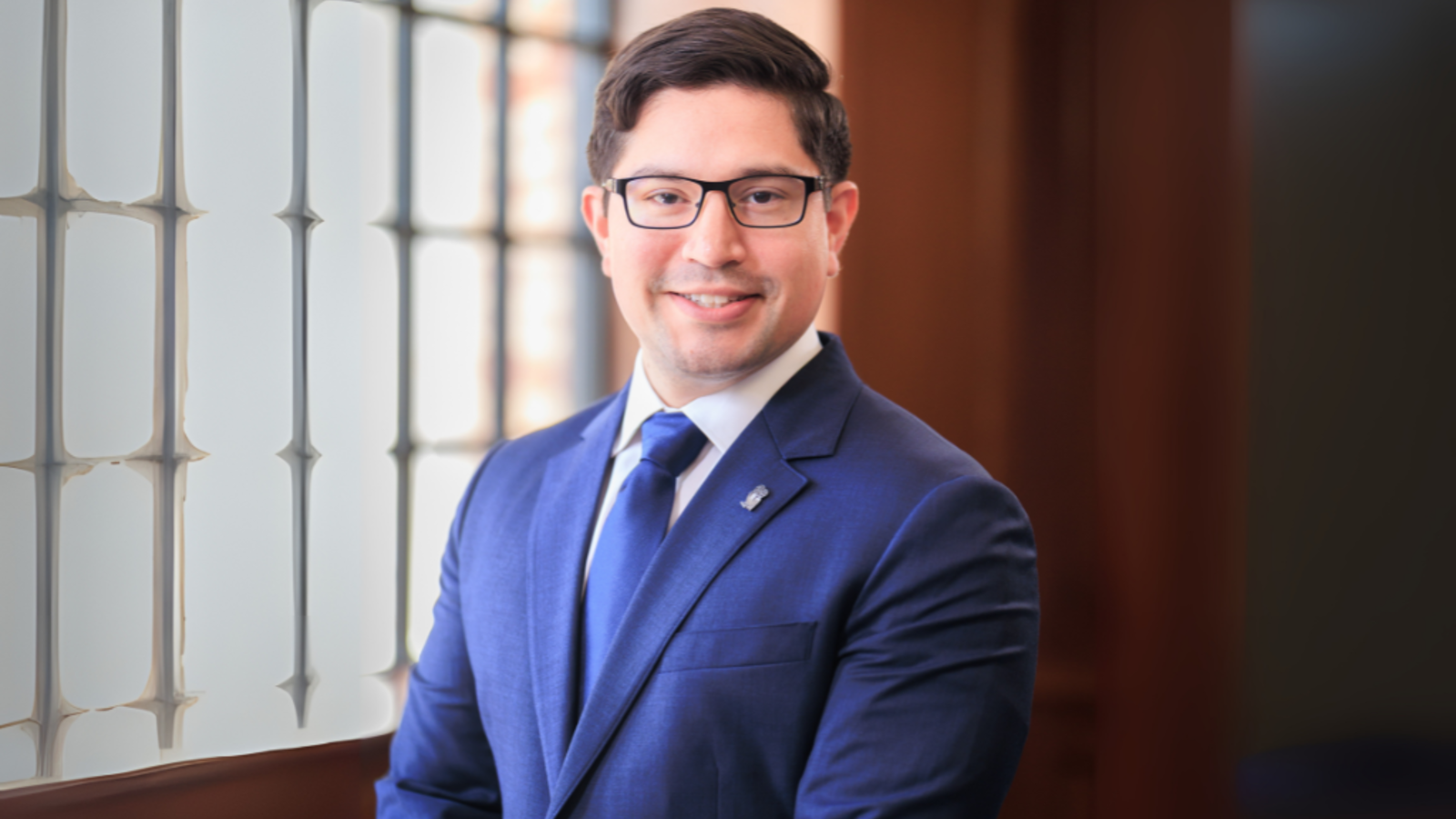
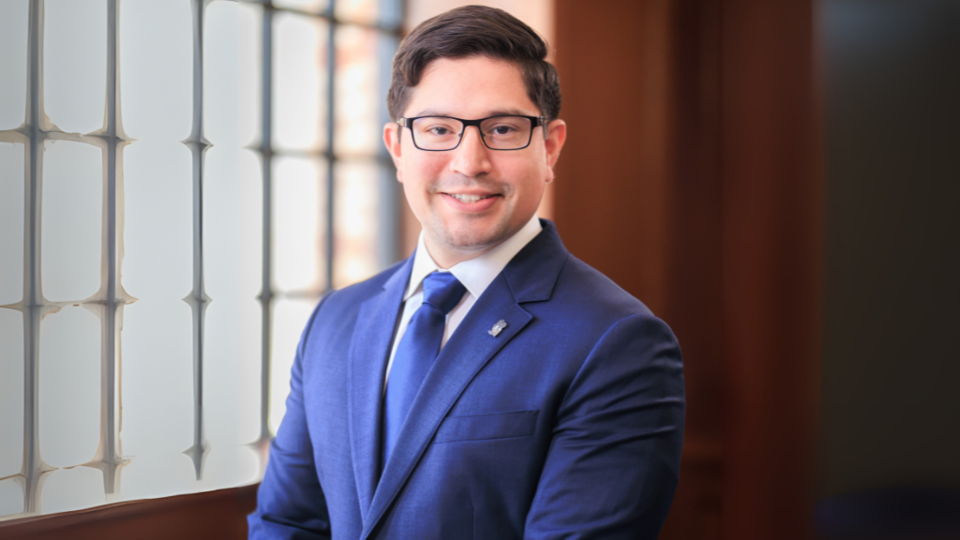
Eduardo Carranza has combined his passions for healthcare and engineering into a career as a senior machine learning engineer at Moffitt Cancer Center. Now, he’s beginning a new chapter at Rice Business as a student in the Professional MBA–Evening Class of 2027. Continue reading Eduardo’s profile to learn more about his journey and his goals for personal growth in the MBA program.
Tell us a little about your career and background.
Education: University of Houston, Computer Engineering
Most Recent Employer and Job Title: Moffitt Cancer Center, Tampa, Florida, senior machine learning engineer
Relevant Career Highlights or Industry Experience: I have been interested in research since my undergraduate studies. As an undergraduate, I had the honor of conducting research at Rice under the supervision of Dr. Richards-Kortum. In her lab, I worked on developing low-cost medical devices, which led to my first scientific publication. That same passion for healthcare and engineering has led me to what I do today. I currently work at Moffitt Cancer Center, where I research the applications of Ai in cancer. During my time at Moffitt, I have had the opportunity to present my research at conferences, as well as publish my work.
What is a fun fact about you?
I love to learn. I am currently working on learning Japanese and improving my piano skills.
Why did you choose Rice Business?
I chose Rice not because it’s easy, but because it’s hard. Jokes aside, I chose to attend Rice because of its tight-knit community and its reputation for rigorous courses. I knew that the rigor would turn me into a better version of myself.
Why did you choose our Professional MBA program?
I chose the Professional MBA-Evening program as it aligns with my busy work schedule. It allows me to keep a good work, school and family balance while investing in myself.
How are you feeling about starting your MBA? What are you most looking forward to?
I am excited to start my journey at Rice Business. I look forward to improving my leadership skills, business acumen and taking on extracurricular projects where I can apply these new skills in real time.
How was your experience during launch week? What were your first impressions of the program and your classmates?
Launch week was an amazing experience. I have never been so tired and energized at the same time. I was astonished at how much we learned in a week. The professors were so engaging that I could not wait until the next lecture. I was impressed by the passion the professors expressed during the lectures, which helped with learning new concepts and set the standard for all my future classes. I was impressed by the diverse backgrounds of my classmates. It was a great feeling to be among like-minded individuals who share the same mindset of wanting to improve themselves.
Eduardo Carranza is a Professional MBA student in the Class of 2027.
The Rice MBA
Should I Take the GMAT for Business School?
Wondering if you should take the GMAT for business school? While many MBA programs have gone test-optional, submitting a strong GMAT score can still boost your application, increase scholarship opportunities and improve career outcomes at top schools like Rice Business.


If you’re considering applying to business school, you may be wondering if you need to take the Graduate Management Admission Test, or GMAT.
A quick google search for most programs will tell you the same thing. Many top MBA programs, including some Rice Business programs, now offer test waivers or have gone test-optional. But what it won’t tell you is that the GMAT is still worth taking — and can be a powerful advantage.
Here’s what you should know about the GMAT and why you might want to take it.
What To Know
Signals Academic Readiness
The GMAT is a standardized exam that measures analytical, quantitative, verbal and reasoning skills. For decades, b-schools have used the test to gauge prospective student readiness.
At Rice Business, we value students from all backgrounds — humanities, social sciences, creative fields and beyond — and the perspectives they bring to the classroom. However, if your undergraduate major didn’t emphasize quantitative skills, the GMAT is a way to demonstrate you’re prepared for the rigors of finance, accounting and data-driven MBA coursework.
Helps You Stand Out in a Competitive Pool
Top MBA programs attract thousands of talented applicants. Even in a test-optional world, submitting a competitive GMAT score can help differentiate your application.
Think of it this way: If many applicants skip the test, then those who do submit strong scores are more likely to stand out. At Rice Business, we take a holistic view of every application, but for many schools, the GMAT can serve as a valuable tie-breaker in a competitive pool.
Boosts Employer Perception
Many MBA applicants don’t realize that certain industries still look at GMAT scores during recruiting. Investment banking, private equity and top consulting firms are known to ask for them, even post-MBA.

Why? A GMAT score is seen as an indicator of problem-solving ability and analytical strength.
More than half of Rice MBA graduates pursue careers in consulting, investment banking and energy finance. For students exploring careers in investment banking and financial services — and especially those pivoting in from another field — a strong GMAT is more than a check box. It’s your competitive edge as employers consider which applicants to extend an interview to.
Because our Career Development Office (CDO) is in regular conversation with top recruiters, we’ve seen the difference having a solid GMAT score can make in highly selective recruiting processes. Continue reading about what else recruiters are looking for.
Interested in Rice Business?
Potentially Unlock Scholarship Opportunities
There are a variety of scholarship opportunities for Rice Business students — but merit-based scholarships are one of the main ways we help Full-Time students finance their degrees.
In review, our admissions board considers factors like career progression, community involvement, personal strengths and especially academics. This means a high GMAT score can potentially translate directly into financial savings.
Offers Future Flexibility
Did you know your GMAT score is valid for five years once you take the exam?
If you decide to apply somewhere else or your top school changes its admissions requirements, it’s never a bad idea to have a test score handy. Taking the test now gives you options later — without the pressure of studying again down the road.
Shows Commitment
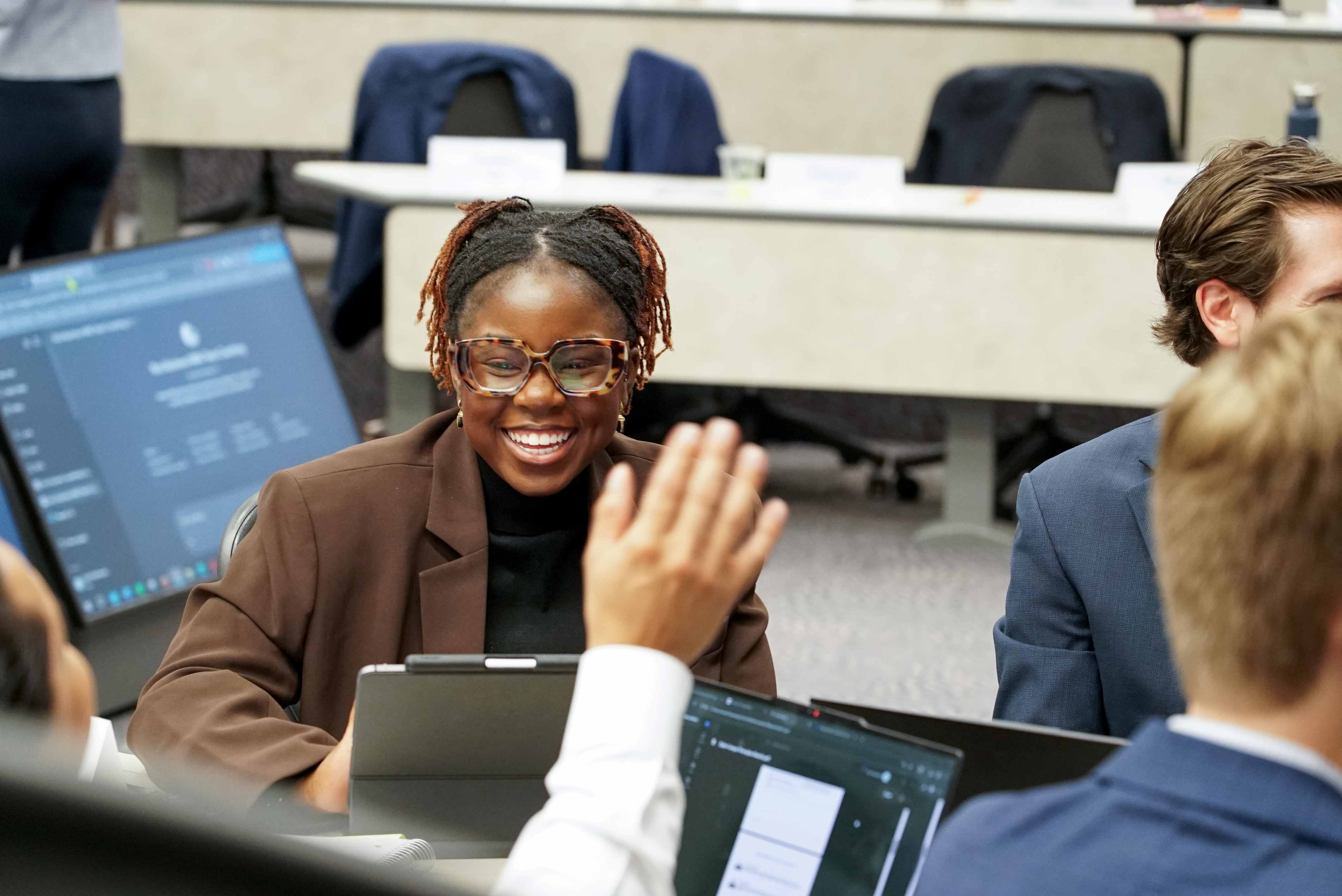
Sitting for the GMAT is a signal. Not only does it show schools and top companies you’re serious about business school, it shows you're ready to compete at a high level. Admissions teams, including our Rice Business Recruiting and Admissions Office, notice that kind of commitment.
Submitting a test score isn't about perfection, it’s about demonstrating effort, preparation and a willingness to challenge yourself — qualities that will prove useful long after you graduate.
So, Should You Take the GMAT?
Depending on your desired program, you may not need to take the GMAT. But if you’re applying to a top MBA program like Rice Business, we recommend it — considering it can strengthen your application, improve your funding opportunities and boost your recruiting success later on.
Learn more about the GMAT and GRE from our admissions team.




